University Nursing Essay: Andrew's Psychosocial Development Analysis
VerifiedAdded on 2022/11/01
|8
|2004
|293
Essay
AI Summary
This essay delves into the psychosocial development of Andrew, a 2.5-year-old attending daycare, as a case study for nursing students. The analysis focuses on Erik Erikson's stages of psychosocial development, particularly the initiative vs. guilt and autonomy vs. shame and doubt phases, relating these concepts to Andrew's challenges with toilet training and his mother's concerns about peer interaction, healthy eating, and active play. The essay highlights the importance of understanding the interplay between nature and nurture in shaping a child's development, emphasizing the role of early experiences and parental support in fostering a child's well-being. It discusses the factors that influence psychosocial development, including health, nutrition, and family relationships. The essay concludes by advising nurses and parents to monitor children's development while avoiding excessive pressure, recognizing the essential aspects of cognitive, motor, behavioral, and social skill enhancement during this crucial stage. The essay also references relevant academic literature to support its arguments.
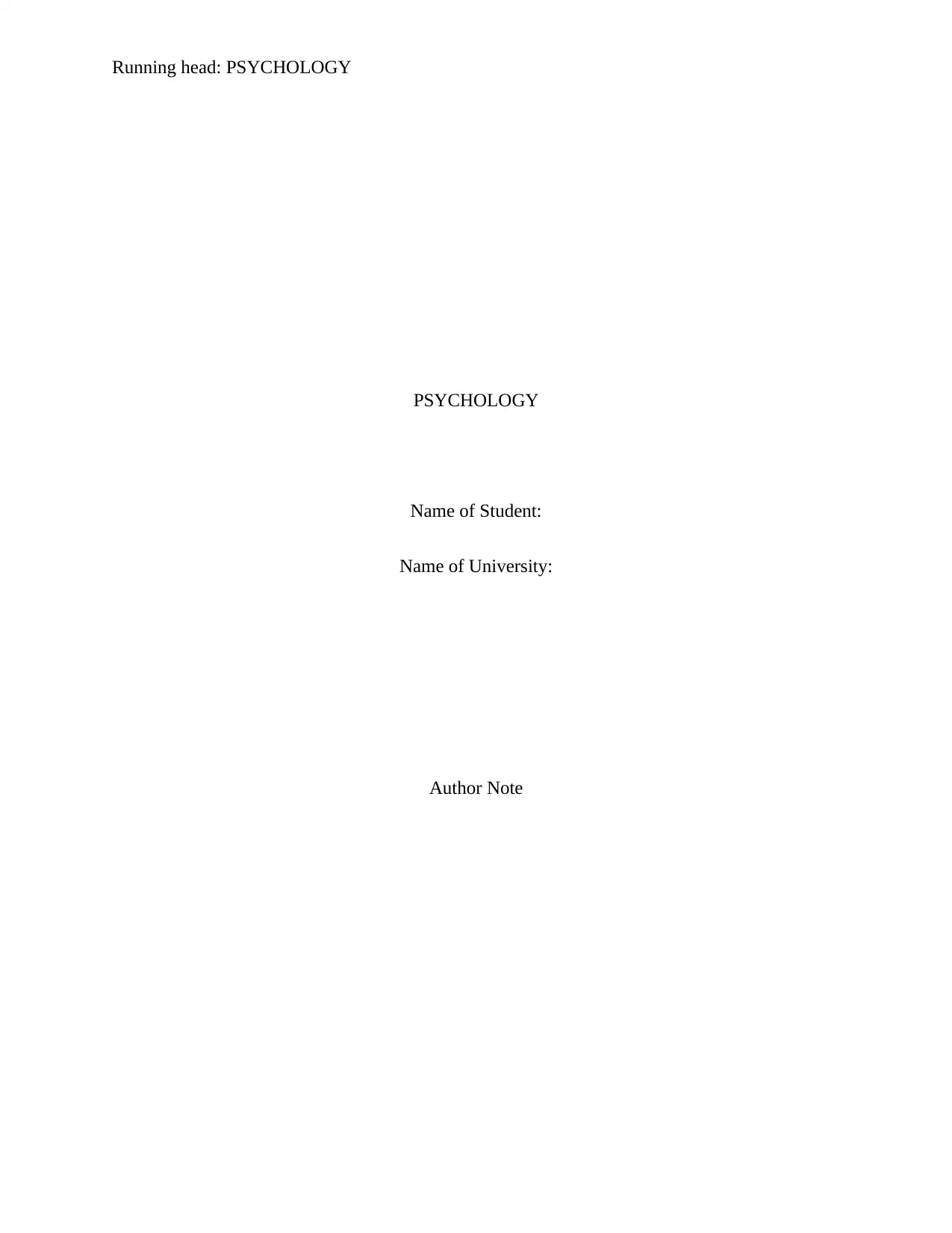
Running head: PSYCHOLOGY
PSYCHOLOGY
Name of Student:
Name of University:
Author Note
PSYCHOLOGY
Name of Student:
Name of University:
Author Note
Paraphrase This Document
Need a fresh take? Get an instant paraphrase of this document with our AI Paraphraser
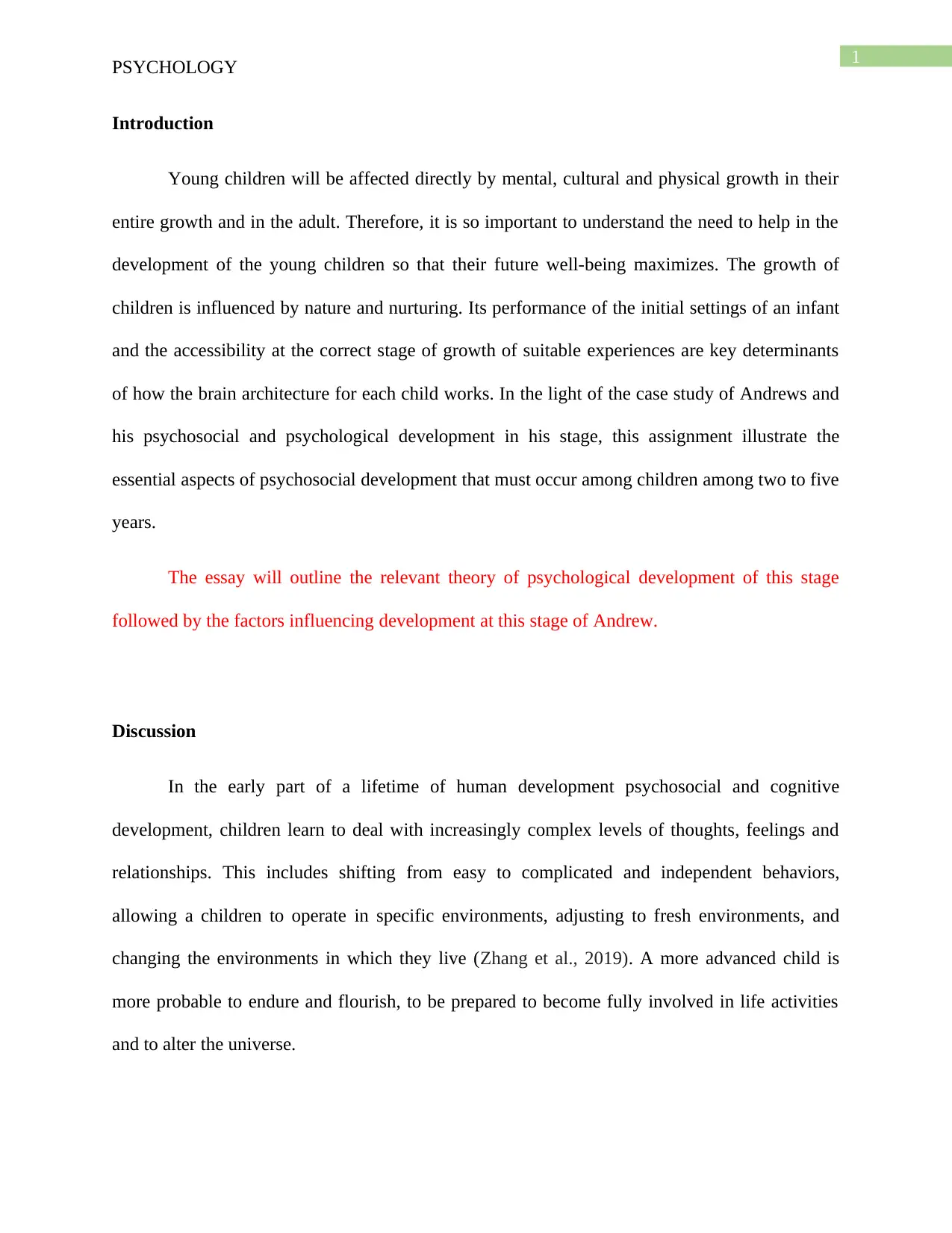
1
PSYCHOLOGY
Introduction
Young children will be affected directly by mental, cultural and physical growth in their
entire growth and in the adult. Therefore, it is so important to understand the need to help in the
development of the young children so that their future well-being maximizes. The growth of
children is influenced by nature and nurturing. Its performance of the initial settings of an infant
and the accessibility at the correct stage of growth of suitable experiences are key determinants
of how the brain architecture for each child works. In the light of the case study of Andrews and
his psychosocial and psychological development in his stage, this assignment illustrate the
essential aspects of psychosocial development that must occur among children among two to five
years.
The essay will outline the relevant theory of psychological development of this stage
followed by the factors influencing development at this stage of Andrew.
Discussion
In the early part of a lifetime of human development psychosocial and cognitive
development, children learn to deal with increasingly complex levels of thoughts, feelings and
relationships. This includes shifting from easy to complicated and independent behaviors,
allowing a children to operate in specific environments, adjusting to fresh environments, and
changing the environments in which they live (Zhang et al., 2019). A more advanced child is
more probable to endure and flourish, to be prepared to become fully involved in life activities
and to alter the universe.
PSYCHOLOGY
Introduction
Young children will be affected directly by mental, cultural and physical growth in their
entire growth and in the adult. Therefore, it is so important to understand the need to help in the
development of the young children so that their future well-being maximizes. The growth of
children is influenced by nature and nurturing. Its performance of the initial settings of an infant
and the accessibility at the correct stage of growth of suitable experiences are key determinants
of how the brain architecture for each child works. In the light of the case study of Andrews and
his psychosocial and psychological development in his stage, this assignment illustrate the
essential aspects of psychosocial development that must occur among children among two to five
years.
The essay will outline the relevant theory of psychological development of this stage
followed by the factors influencing development at this stage of Andrew.
Discussion
In the early part of a lifetime of human development psychosocial and cognitive
development, children learn to deal with increasingly complex levels of thoughts, feelings and
relationships. This includes shifting from easy to complicated and independent behaviors,
allowing a children to operate in specific environments, adjusting to fresh environments, and
changing the environments in which they live (Zhang et al., 2019). A more advanced child is
more probable to endure and flourish, to be prepared to become fully involved in life activities
and to alter the universe.
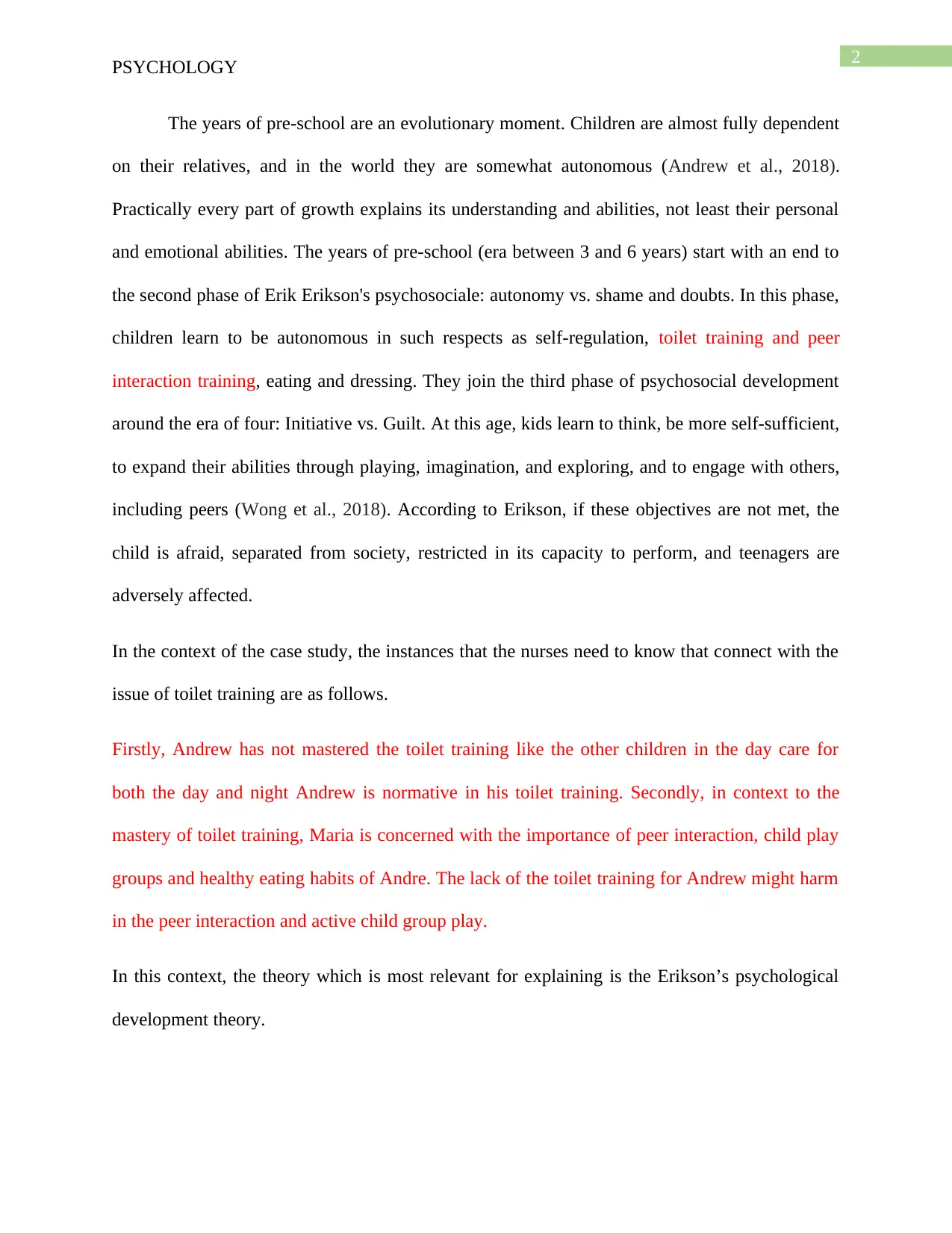
2
PSYCHOLOGY
The years of pre-school are an evolutionary moment. Children are almost fully dependent
on their relatives, and in the world they are somewhat autonomous (Andrew et al., 2018).
Practically every part of growth explains its understanding and abilities, not least their personal
and emotional abilities. The years of pre-school (era between 3 and 6 years) start with an end to
the second phase of Erik Erikson's psychosociale: autonomy vs. shame and doubts. In this phase,
children learn to be autonomous in such respects as self-regulation, toilet training and peer
interaction training, eating and dressing. They join the third phase of psychosocial development
around the era of four: Initiative vs. Guilt. At this age, kids learn to think, be more self-sufficient,
to expand their abilities through playing, imagination, and exploring, and to engage with others,
including peers (Wong et al., 2018). According to Erikson, if these objectives are not met, the
child is afraid, separated from society, restricted in its capacity to perform, and teenagers are
adversely affected.
In the context of the case study, the instances that the nurses need to know that connect with the
issue of toilet training are as follows.
Firstly, Andrew has not mastered the toilet training like the other children in the day care for
both the day and night Andrew is normative in his toilet training. Secondly, in context to the
mastery of toilet training, Maria is concerned with the importance of peer interaction, child play
groups and healthy eating habits of Andre. The lack of the toilet training for Andrew might harm
in the peer interaction and active child group play.
In this context, the theory which is most relevant for explaining is the Erikson’s psychological
development theory.
PSYCHOLOGY
The years of pre-school are an evolutionary moment. Children are almost fully dependent
on their relatives, and in the world they are somewhat autonomous (Andrew et al., 2018).
Practically every part of growth explains its understanding and abilities, not least their personal
and emotional abilities. The years of pre-school (era between 3 and 6 years) start with an end to
the second phase of Erik Erikson's psychosociale: autonomy vs. shame and doubts. In this phase,
children learn to be autonomous in such respects as self-regulation, toilet training and peer
interaction training, eating and dressing. They join the third phase of psychosocial development
around the era of four: Initiative vs. Guilt. At this age, kids learn to think, be more self-sufficient,
to expand their abilities through playing, imagination, and exploring, and to engage with others,
including peers (Wong et al., 2018). According to Erikson, if these objectives are not met, the
child is afraid, separated from society, restricted in its capacity to perform, and teenagers are
adversely affected.
In the context of the case study, the instances that the nurses need to know that connect with the
issue of toilet training are as follows.
Firstly, Andrew has not mastered the toilet training like the other children in the day care for
both the day and night Andrew is normative in his toilet training. Secondly, in context to the
mastery of toilet training, Maria is concerned with the importance of peer interaction, child play
groups and healthy eating habits of Andre. The lack of the toilet training for Andrew might harm
in the peer interaction and active child group play.
In this context, the theory which is most relevant for explaining is the Erikson’s psychological
development theory.
⊘ This is a preview!⊘
Do you want full access?
Subscribe today to unlock all pages.

Trusted by 1+ million students worldwide
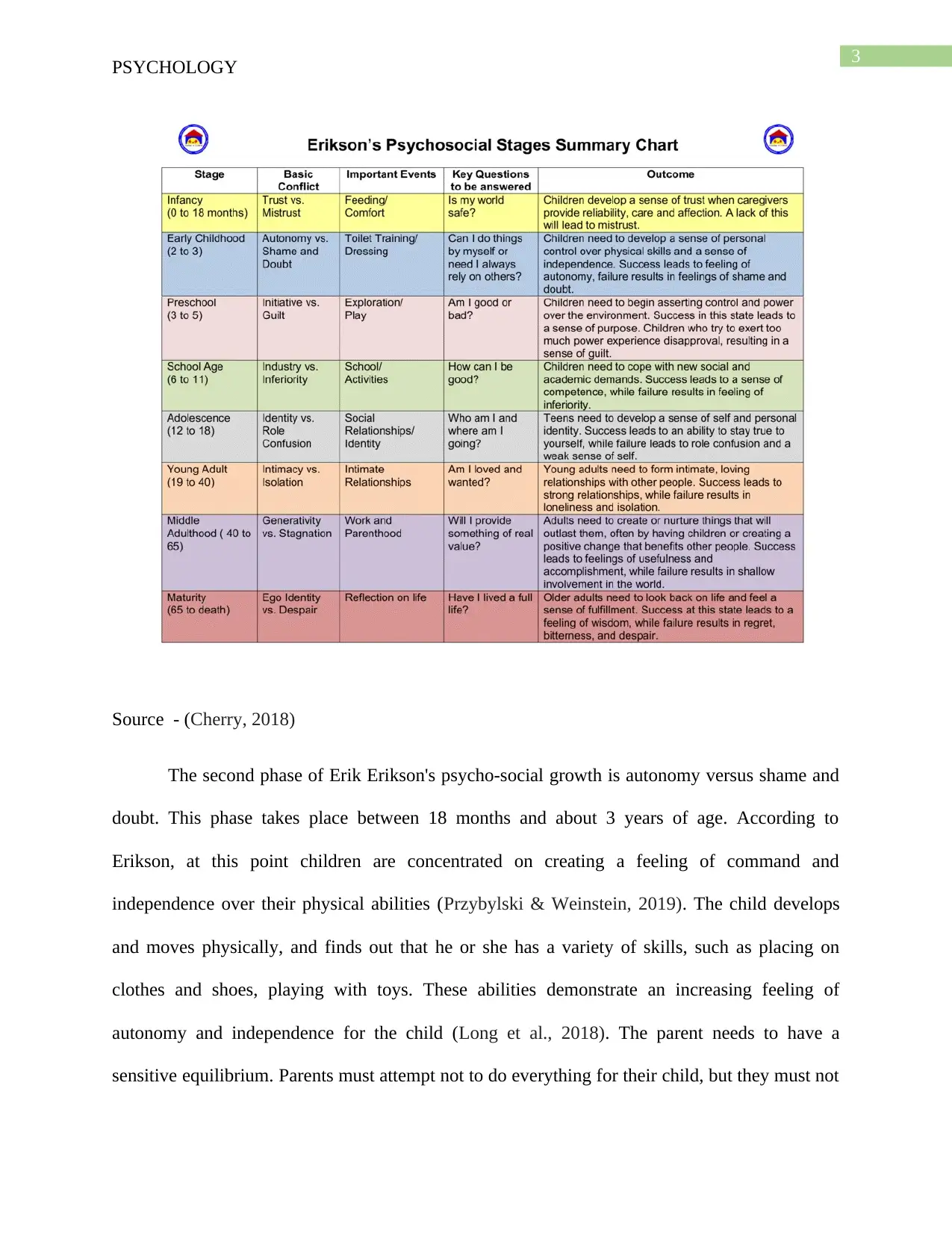
3
PSYCHOLOGY
Source - (Cherry, 2018)
The second phase of Erik Erikson's psycho-social growth is autonomy versus shame and
doubt. This phase takes place between 18 months and about 3 years of age. According to
Erikson, at this point children are concentrated on creating a feeling of command and
independence over their physical abilities (Przybylski & Weinstein, 2019). The child develops
and moves physically, and finds out that he or she has a variety of skills, such as placing on
clothes and shoes, playing with toys. These abilities demonstrate an increasing feeling of
autonomy and independence for the child (Long et al., 2018). The parent needs to have a
sensitive equilibrium. Parents must attempt not to do everything for their child, but they must not
PSYCHOLOGY
Source - (Cherry, 2018)
The second phase of Erik Erikson's psycho-social growth is autonomy versus shame and
doubt. This phase takes place between 18 months and about 3 years of age. According to
Erikson, at this point children are concentrated on creating a feeling of command and
independence over their physical abilities (Przybylski & Weinstein, 2019). The child develops
and moves physically, and finds out that he or she has a variety of skills, such as placing on
clothes and shoes, playing with toys. These abilities demonstrate an increasing feeling of
autonomy and independence for the child (Long et al., 2018). The parent needs to have a
sensitive equilibrium. Parents must attempt not to do everything for their child, but they must not
Paraphrase This Document
Need a fresh take? Get an instant paraphrase of this document with our AI Paraphraser
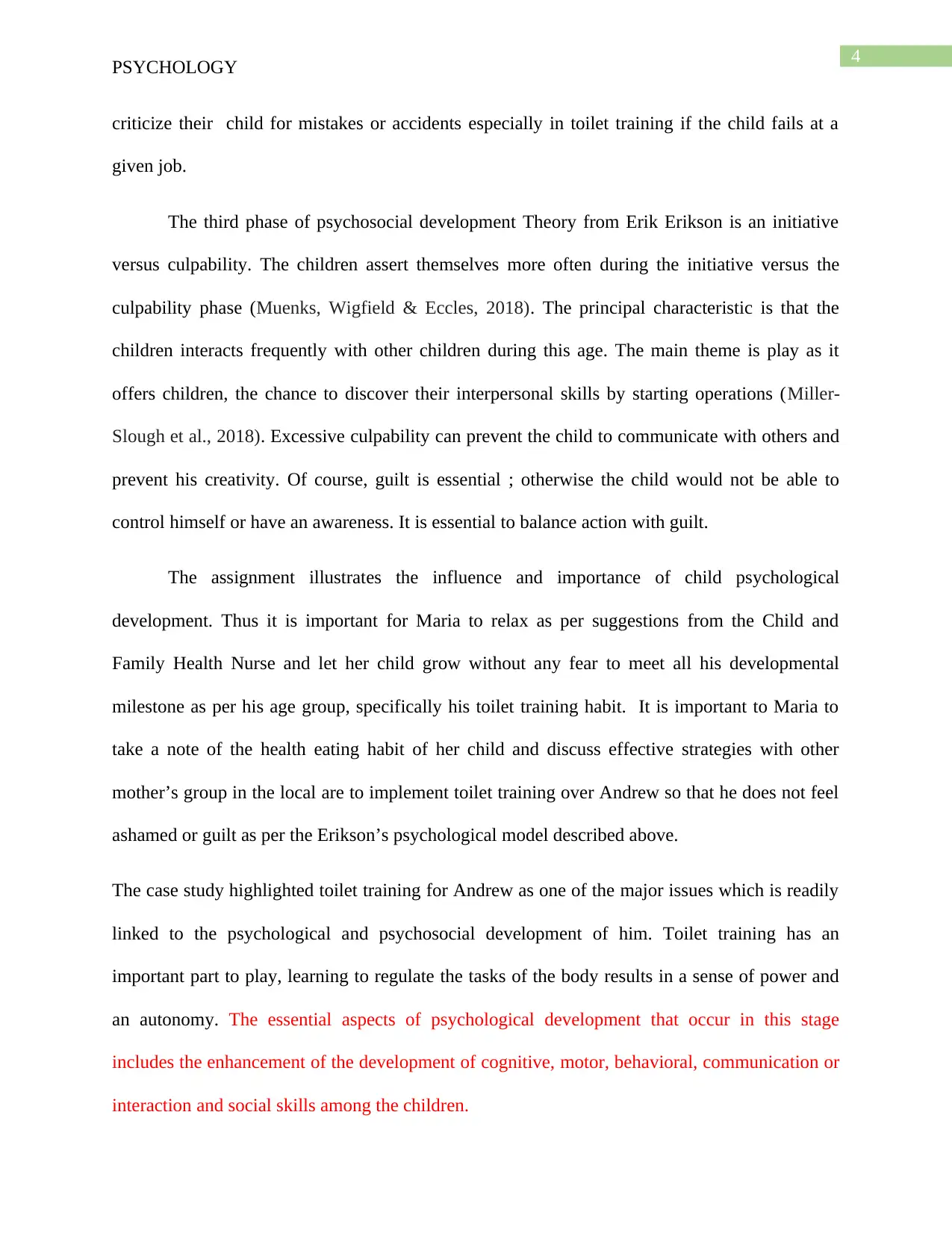
4
PSYCHOLOGY
criticize their child for mistakes or accidents especially in toilet training if the child fails at a
given job.
The third phase of psychosocial development Theory from Erik Erikson is an initiative
versus culpability. The children assert themselves more often during the initiative versus the
culpability phase (Muenks, Wigfield & Eccles, 2018). The principal characteristic is that the
children interacts frequently with other children during this age. The main theme is play as it
offers children, the chance to discover their interpersonal skills by starting operations (Miller‐
Slough et al., 2018). Excessive culpability can prevent the child to communicate with others and
prevent his creativity. Of course, guilt is essential ; otherwise the child would not be able to
control himself or have an awareness. It is essential to balance action with guilt.
The assignment illustrates the influence and importance of child psychological
development. Thus it is important for Maria to relax as per suggestions from the Child and
Family Health Nurse and let her child grow without any fear to meet all his developmental
milestone as per his age group, specifically his toilet training habit. It is important to Maria to
take a note of the health eating habit of her child and discuss effective strategies with other
mother’s group in the local are to implement toilet training over Andrew so that he does not feel
ashamed or guilt as per the Erikson’s psychological model described above.
The case study highlighted toilet training for Andrew as one of the major issues which is readily
linked to the psychological and psychosocial development of him. Toilet training has an
important part to play, learning to regulate the tasks of the body results in a sense of power and
an autonomy. The essential aspects of psychological development that occur in this stage
includes the enhancement of the development of cognitive, motor, behavioral, communication or
interaction and social skills among the children.
PSYCHOLOGY
criticize their child for mistakes or accidents especially in toilet training if the child fails at a
given job.
The third phase of psychosocial development Theory from Erik Erikson is an initiative
versus culpability. The children assert themselves more often during the initiative versus the
culpability phase (Muenks, Wigfield & Eccles, 2018). The principal characteristic is that the
children interacts frequently with other children during this age. The main theme is play as it
offers children, the chance to discover their interpersonal skills by starting operations (Miller‐
Slough et al., 2018). Excessive culpability can prevent the child to communicate with others and
prevent his creativity. Of course, guilt is essential ; otherwise the child would not be able to
control himself or have an awareness. It is essential to balance action with guilt.
The assignment illustrates the influence and importance of child psychological
development. Thus it is important for Maria to relax as per suggestions from the Child and
Family Health Nurse and let her child grow without any fear to meet all his developmental
milestone as per his age group, specifically his toilet training habit. It is important to Maria to
take a note of the health eating habit of her child and discuss effective strategies with other
mother’s group in the local are to implement toilet training over Andrew so that he does not feel
ashamed or guilt as per the Erikson’s psychological model described above.
The case study highlighted toilet training for Andrew as one of the major issues which is readily
linked to the psychological and psychosocial development of him. Toilet training has an
important part to play, learning to regulate the tasks of the body results in a sense of power and
an autonomy. The essential aspects of psychological development that occur in this stage
includes the enhancement of the development of cognitive, motor, behavioral, communication or
interaction and social skills among the children.
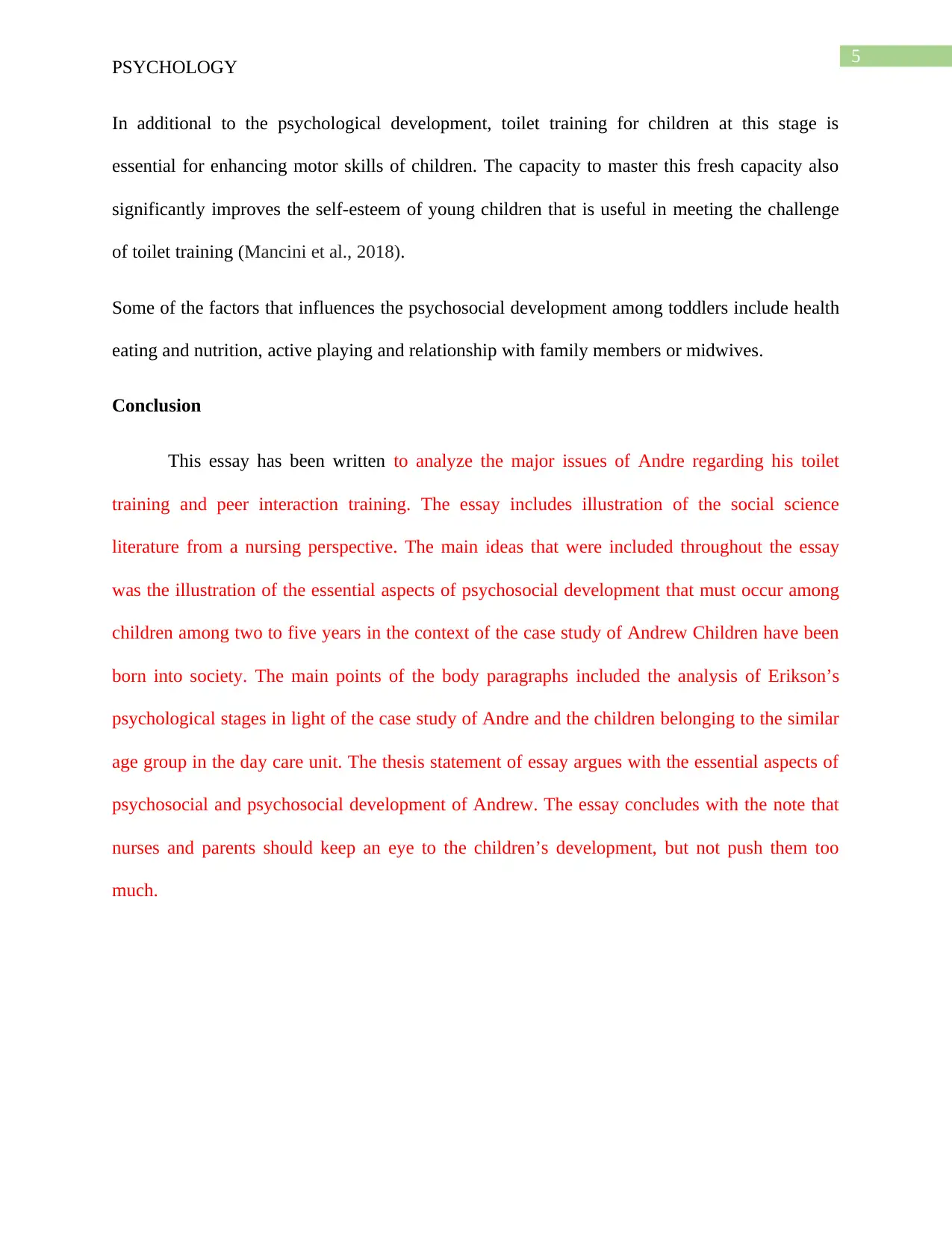
5
PSYCHOLOGY
In additional to the psychological development, toilet training for children at this stage is
essential for enhancing motor skills of children. The capacity to master this fresh capacity also
significantly improves the self-esteem of young children that is useful in meeting the challenge
of toilet training (Mancini et al., 2018).
Some of the factors that influences the psychosocial development among toddlers include health
eating and nutrition, active playing and relationship with family members or midwives.
Conclusion
This essay has been written to analyze the major issues of Andre regarding his toilet
training and peer interaction training. The essay includes illustration of the social science
literature from a nursing perspective. The main ideas that were included throughout the essay
was the illustration of the essential aspects of psychosocial development that must occur among
children among two to five years in the context of the case study of Andrew Children have been
born into society. The main points of the body paragraphs included the analysis of Erikson’s
psychological stages in light of the case study of Andre and the children belonging to the similar
age group in the day care unit. The thesis statement of essay argues with the essential aspects of
psychosocial and psychosocial development of Andrew. The essay concludes with the note that
nurses and parents should keep an eye to the children’s development, but not push them too
much.
PSYCHOLOGY
In additional to the psychological development, toilet training for children at this stage is
essential for enhancing motor skills of children. The capacity to master this fresh capacity also
significantly improves the self-esteem of young children that is useful in meeting the challenge
of toilet training (Mancini et al., 2018).
Some of the factors that influences the psychosocial development among toddlers include health
eating and nutrition, active playing and relationship with family members or midwives.
Conclusion
This essay has been written to analyze the major issues of Andre regarding his toilet
training and peer interaction training. The essay includes illustration of the social science
literature from a nursing perspective. The main ideas that were included throughout the essay
was the illustration of the essential aspects of psychosocial development that must occur among
children among two to five years in the context of the case study of Andrew Children have been
born into society. The main points of the body paragraphs included the analysis of Erikson’s
psychological stages in light of the case study of Andre and the children belonging to the similar
age group in the day care unit. The thesis statement of essay argues with the essential aspects of
psychosocial and psychosocial development of Andrew. The essay concludes with the note that
nurses and parents should keep an eye to the children’s development, but not push them too
much.
⊘ This is a preview!⊘
Do you want full access?
Subscribe today to unlock all pages.

Trusted by 1+ million students worldwide
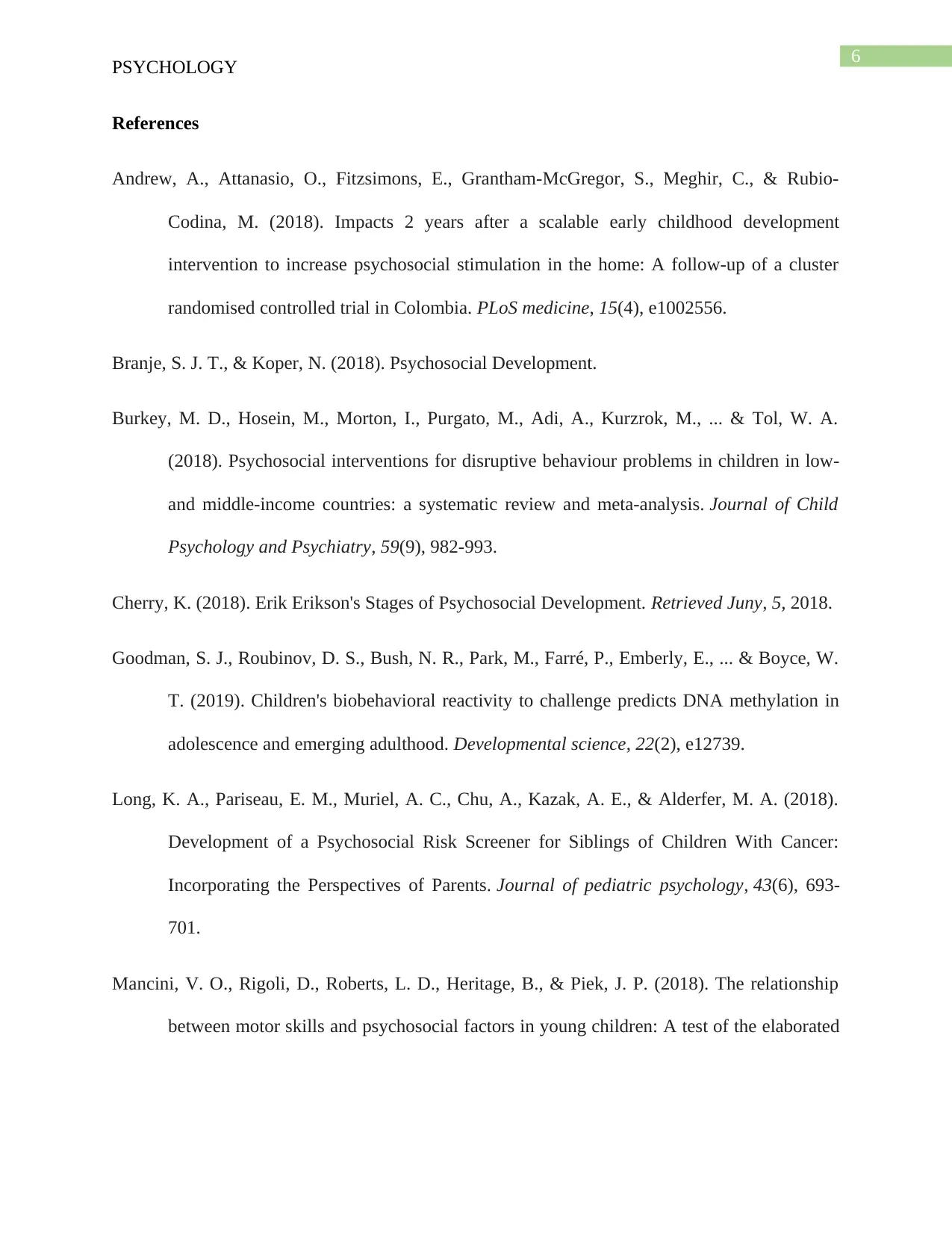
6
PSYCHOLOGY
References
Andrew, A., Attanasio, O., Fitzsimons, E., Grantham-McGregor, S., Meghir, C., & Rubio-
Codina, M. (2018). Impacts 2 years after a scalable early childhood development
intervention to increase psychosocial stimulation in the home: A follow-up of a cluster
randomised controlled trial in Colombia. PLoS medicine, 15(4), e1002556.
Branje, S. J. T., & Koper, N. (2018). Psychosocial Development.
Burkey, M. D., Hosein, M., Morton, I., Purgato, M., Adi, A., Kurzrok, M., ... & Tol, W. A.
(2018). Psychosocial interventions for disruptive behaviour problems in children in low‐
and middle‐income countries: a systematic review and meta‐analysis. Journal of Child
Psychology and Psychiatry, 59(9), 982-993.
Cherry, K. (2018). Erik Erikson's Stages of Psychosocial Development. Retrieved Juny, 5, 2018.
Goodman, S. J., Roubinov, D. S., Bush, N. R., Park, M., Farré, P., Emberly, E., ... & Boyce, W.
T. (2019). Children's biobehavioral reactivity to challenge predicts DNA methylation in
adolescence and emerging adulthood. Developmental science, 22(2), e12739.
Long, K. A., Pariseau, E. M., Muriel, A. C., Chu, A., Kazak, A. E., & Alderfer, M. A. (2018).
Development of a Psychosocial Risk Screener for Siblings of Children With Cancer:
Incorporating the Perspectives of Parents. Journal of pediatric psychology, 43(6), 693-
701.
Mancini, V. O., Rigoli, D., Roberts, L. D., Heritage, B., & Piek, J. P. (2018). The relationship
between motor skills and psychosocial factors in young children: A test of the elaborated
PSYCHOLOGY
References
Andrew, A., Attanasio, O., Fitzsimons, E., Grantham-McGregor, S., Meghir, C., & Rubio-
Codina, M. (2018). Impacts 2 years after a scalable early childhood development
intervention to increase psychosocial stimulation in the home: A follow-up of a cluster
randomised controlled trial in Colombia. PLoS medicine, 15(4), e1002556.
Branje, S. J. T., & Koper, N. (2018). Psychosocial Development.
Burkey, M. D., Hosein, M., Morton, I., Purgato, M., Adi, A., Kurzrok, M., ... & Tol, W. A.
(2018). Psychosocial interventions for disruptive behaviour problems in children in low‐
and middle‐income countries: a systematic review and meta‐analysis. Journal of Child
Psychology and Psychiatry, 59(9), 982-993.
Cherry, K. (2018). Erik Erikson's Stages of Psychosocial Development. Retrieved Juny, 5, 2018.
Goodman, S. J., Roubinov, D. S., Bush, N. R., Park, M., Farré, P., Emberly, E., ... & Boyce, W.
T. (2019). Children's biobehavioral reactivity to challenge predicts DNA methylation in
adolescence and emerging adulthood. Developmental science, 22(2), e12739.
Long, K. A., Pariseau, E. M., Muriel, A. C., Chu, A., Kazak, A. E., & Alderfer, M. A. (2018).
Development of a Psychosocial Risk Screener for Siblings of Children With Cancer:
Incorporating the Perspectives of Parents. Journal of pediatric psychology, 43(6), 693-
701.
Mancini, V. O., Rigoli, D., Roberts, L. D., Heritage, B., & Piek, J. P. (2018). The relationship
between motor skills and psychosocial factors in young children: A test of the elaborated
Paraphrase This Document
Need a fresh take? Get an instant paraphrase of this document with our AI Paraphraser
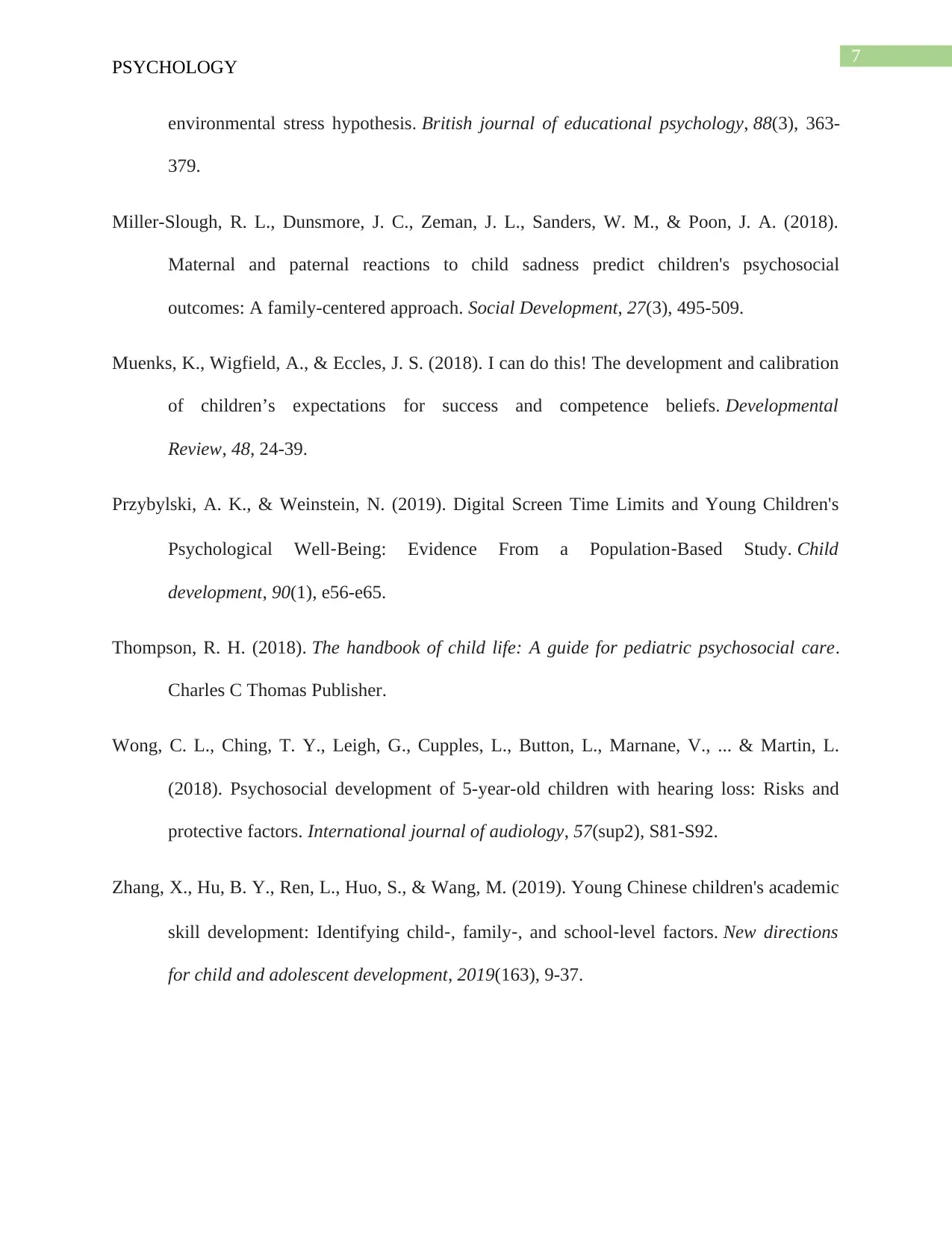
7
PSYCHOLOGY
environmental stress hypothesis. British journal of educational psychology, 88(3), 363-
379.
Miller‐Slough, R. L., Dunsmore, J. C., Zeman, J. L., Sanders, W. M., & Poon, J. A. (2018).
Maternal and paternal reactions to child sadness predict children's psychosocial
outcomes: A family‐centered approach. Social Development, 27(3), 495-509.
Muenks, K., Wigfield, A., & Eccles, J. S. (2018). I can do this! The development and calibration
of children’s expectations for success and competence beliefs. Developmental
Review, 48, 24-39.
Przybylski, A. K., & Weinstein, N. (2019). Digital Screen Time Limits and Young Children's
Psychological Well‐Being: Evidence From a Population‐Based Study. Child
development, 90(1), e56-e65.
Thompson, R. H. (2018). The handbook of child life: A guide for pediatric psychosocial care.
Charles C Thomas Publisher.
Wong, C. L., Ching, T. Y., Leigh, G., Cupples, L., Button, L., Marnane, V., ... & Martin, L.
(2018). Psychosocial development of 5-year-old children with hearing loss: Risks and
protective factors. International journal of audiology, 57(sup2), S81-S92.
Zhang, X., Hu, B. Y., Ren, L., Huo, S., & Wang, M. (2019). Young Chinese children's academic
skill development: Identifying child‐, family‐, and school‐level factors. New directions
for child and adolescent development, 2019(163), 9-37.
PSYCHOLOGY
environmental stress hypothesis. British journal of educational psychology, 88(3), 363-
379.
Miller‐Slough, R. L., Dunsmore, J. C., Zeman, J. L., Sanders, W. M., & Poon, J. A. (2018).
Maternal and paternal reactions to child sadness predict children's psychosocial
outcomes: A family‐centered approach. Social Development, 27(3), 495-509.
Muenks, K., Wigfield, A., & Eccles, J. S. (2018). I can do this! The development and calibration
of children’s expectations for success and competence beliefs. Developmental
Review, 48, 24-39.
Przybylski, A. K., & Weinstein, N. (2019). Digital Screen Time Limits and Young Children's
Psychological Well‐Being: Evidence From a Population‐Based Study. Child
development, 90(1), e56-e65.
Thompson, R. H. (2018). The handbook of child life: A guide for pediatric psychosocial care.
Charles C Thomas Publisher.
Wong, C. L., Ching, T. Y., Leigh, G., Cupples, L., Button, L., Marnane, V., ... & Martin, L.
(2018). Psychosocial development of 5-year-old children with hearing loss: Risks and
protective factors. International journal of audiology, 57(sup2), S81-S92.
Zhang, X., Hu, B. Y., Ren, L., Huo, S., & Wang, M. (2019). Young Chinese children's academic
skill development: Identifying child‐, family‐, and school‐level factors. New directions
for child and adolescent development, 2019(163), 9-37.
1 out of 8
Related Documents
Your All-in-One AI-Powered Toolkit for Academic Success.
+13062052269
info@desklib.com
Available 24*7 on WhatsApp / Email
![[object Object]](/_next/static/media/star-bottom.7253800d.svg)
Unlock your academic potential
Copyright © 2020–2026 A2Z Services. All Rights Reserved. Developed and managed by ZUCOL.





